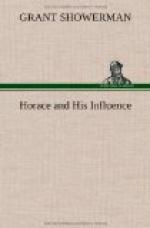Horace may entertain a well-bred skepticism of Jupiter’s thunderbolt, and he may pass the jest on the indifference of the Epicurean gods to the affairs of men. When he does so, it is with the gods of mythology and literature he is dealing, not with really religious gods. For the old-fashioned faith of the country he entertains only the kindliest regard. The images that rise in his mind at the mention of religion pure and undefiled are not the gaudy spectacles to be seen in the marbled streets of the capital. They are images of incense rising in autumn from the ancient altar on the home-stead, of the feast of the Terminalia with its slain lamb, of libations of ruddy wine and offerings of bright flowers on the clear waters of some ancestral spring, of the simple hearth of the farmhouse, of the family table resplendent with the silver salinum, heirloom of generations, from which the grave paterfamilias makes the pious offering of crackling salt and meal to little gods crowned with rosemary and myrtle, of the altar beneath the pine to the Virgin goddess, of Faunus the shepherd-god, in the humor of wooing, roaming the sunny farmfields in quest of retreating wood-nymphs, of Priapus the garden-god, and Silvanus, guardian of boundaries, and, most of all, and typifying all, of the faith of rustic Phidyle, with clean hands and a pure heart raising palms to heaven at the new of the moon, and praying for the full-hanging vine, thrifty fields of corn, and unblemished lambs. Of the religious life represented by these, Horace is no more tempted to make light than he is tempted to delineate the Italian rustic as De Maupassant does the French,—as an amusing animal, with just enough of the human in his composition to make him ludicrous.
iv. THE INTERPRETER OF THE POPULAR WISDOM
Finally, in the homely, unconventional wisdom which fills Satire and Epistle and sparkles from the Odes, Horace is again the national interpreter. The masses of Rome or Italy had little consciously to do with either Stoicism or Epicureanism. Their philosophy was vigorous common sense, and was learned from living, not from conning books. Horace, too, for all his having been a student of formal philosophy in Athens, for all his professed faith in philosophy as a boon for rich and poor and old and young, and for all his inclination to yield to the natural human impulse toward system and adopt the philosophy of one of the Schools, is a consistent follower of neither Stoic nor Epicurean. Both systems attracted him by their virtues, and both repelled him because of their weaknesses. His half-humorous confession of wavering allegiance is only a reflection of the shiftings of a mind open to the appeal of both:
And, lest you inquire under what guide or to what hearth I look for safety, I will tell you that I am sworn to obedience in no master’s formula, but am a guest in whatever haven the tempest sweeps me to. Now I am full of action and deep in the waves of civic life, an unswerving follower and guardian of the true virtue, now I secretly backslide to the precepts of Aristippus, and try to bend circumstance to myself, not myself to circumstance.




